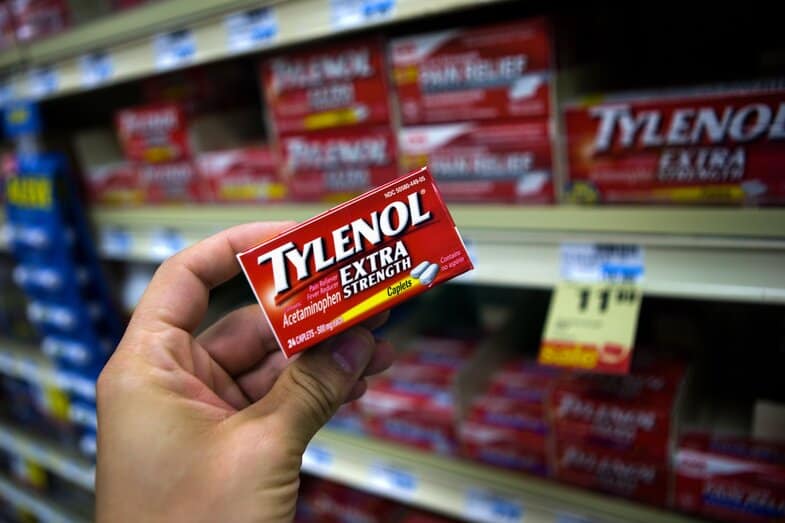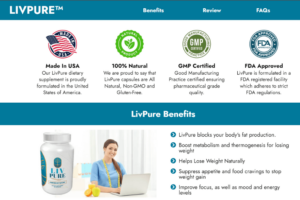Can you take Tylenol on an empty stomach? Some medicine should be taken with food, and some can be taken on an empty stomach. What about Tylenol? In this article, I’ll describe whether you can take Tylenol on an empty stomach or not, as well as dosage guidelines.
Can Tylenol be taken on an empty stomach? Tylenol can be taken on an empty stomach with a glass of water. Some people, however, might feel ill taking Tylenol on an empty stomach. If you do feel ill, then next time, take Tylenol with food or after eating.
Tylenol, the most common brand name of the drug acetaminophen, is an analgesic (relieves pain) and antipyretic (reduces temperature during a fever). You can buy it over-the-counter (OTC) to treat minor pains and fever. You can take it on an empty stomach.
Read on to learn more about Tylenol, its side effects, and the recommended dosages.
Can You Take Tylenol on an Empty Stomach?
An empty stomach absorbs Tylenol more quickly since there is no food to deter the absorption process. However, people who have a sensitive gastrointestinal tract may have to take the medication with food.
Tylenol is not as harmful to the stomach as Aspirin and Advil. Aspirin and Advil should be taken with food or after meals due to their adverse effect on the digestive system.
Tylenol is not as strong and more gentle on the body. However, if you feel ill or nauseous after taking Tylenol on an empty stomach, then next time, just take it with food or after you eat.
Formulation of Tylenol
For Adults
- Capsules Extra Strength packs 500 mg Acetaminophen
- Tylenol Extra Strength Coated Tablets 500 mg Acetaminophen
- Tylenol PM Extra Strength Liquid for children over 12 years old and adults
- Dissolve Packs for over 12 years old and adults (Tylenol)
For Children
- Tylenol for 4 – 11 years old
- Children’s Tylenol for 6-11 years old
- Chewables for 2 – 11 years old
- Children’s Tylenol Dissolve Packs for 6 – 11 years old
Recommended Dosages
You must consider the weight and age of the person for the proper dosage. If the child weighs less than 36 pounds and is under two or four years old, you must not give them Tylenol.
For Adults
Capsules Extra Strength packs 500 mg Acetaminophen: 2 powders every 6 hours as needed.
Extra Strength Coated Tablets 500 mg Acetaminophen (Tylenol): 2 tablets every 6 hours as needed, not to exceed six tablets within twenty-four hours.
PM Extra Strength Liquid for children over 12 years old and adults (Tylenol): 30 ml at bedtime, not to exceed 30 ml within twenty-four hours
Dissolve Packs for over 12 years old and adults (Tylenol): 2 powders every 6 hours as needed, not to exceed six packs within twenty-four hours.
For Children
Children’s Tylenol for 4 – 11 years old: (not to exceed five doses in twenty-four hours)
- 4 – 5 years old; weighing 36 to 47 pounds – 5 ml every 4 hours
- 6-11 years old, weighing 48 to 95 pounds – 10 ml every 4 hours
Children’s Tylenol (cold and flu) for 6-11 years old; weighing 48 to 95 pounds: 10 ml every 4 hours (not to exceed five doses in twenty-four hours)
Chewables for 2 – 11 years old: (not to exceed five doses in twenty-four hours)
- 2 – 3 years old; weighing 24 to 35 pounds – 1 tablet every 4 hours
- 4 – 5 years old; weighing 36 to 47 pounds – 1½ tablets every 4 hours
- 6 – 8 years old; weighing 48 to 59 pounds – 2 tablets every 4 hours
- 9 – 10 years old; weighing 60 to 71 pounds = 2½ tablets every 4 hours
- 11 years old; weighing 71 to 95 pounds – 3 tablets every 4 hours
Children’s Dissolve Packs for 6 – 11 years old (Tylenol) (not to exceed five doses in twenty-four hours)
- 6 – 8 years old; weighing 48 to 59 pound – 2 powders every 4 hours
- 9 – 10 years old; weighing 60 to 71 pounds – 2 powders every 4 hour
- 11 years old; weighing 71 to 95 pounds – 3 powders every 4 hours
Can You Take Tylenol with Mucinex?

What Are the Uses of Tylenol?
Tylenol’s effect is temporary, so if you still feel unwell, you can take another dose. But, if the symptoms persist after three days or more, you have to consult your physician because there might be a severe underlying disease causing the symptoms.
As an analgesic (relieves pain) and antipyretic (reduces temperature during a fever), you can use Tylenol for these conditions:
- Fever
- Headache
- Flu symptoms
- Common colds
- Toothache
- Backache
- Menstrual cramps
- Joint pains
- Muscle pain
- Other minor aches/pains
Side Effects of Tylenol
Many people don’t experience any side effects. However, a few people have an allergy, which could result in anaphylactic shock.
If you notice any allergic symptoms, you must go to the nearest clinic and consult a doctor. Symptoms of an allergy include:
- Rashes on your skin
- Itching
- Swollen tongue
- Dyspnea (difficulty in breathing)
Take note that anaphylactic shock due to allergy is fatal. However, after a dose of an anti-allergy drug or injection, you’ll be fine.
Some of the minor side effects of Tylenol are:
- Headache
- Nausea
- Stomach pain
- Vomiting
- Sweating
- Lightheadedness
As mentioned earlier, you can take Tylenol on an empty stomach; however, some people might feel nauseous or slightly ill. If you do feel ill, next time, take Tylenol with food or after eating.
Some rare side effects of Acetaminophen, the active component of Tylenol, are:
- Dysuria (difficulty in urination)
- Dark stools
- Severe stomach pain
Precautions When Taking Tylenol
- Store the medication at room temperature (20 – 25 °C). Don’t place it in hot places, as this may reduce its effectiveness.
- Take Tylenol only as needed. Stop taking Tylenol once the pain or fever disappears. Taking Tylenol should not be likened with taking antibiotics and maintenance drugs.
- Please consult a doctor if you are pregnant or breastfeeding before taking the medication. Even though there are still no large-scale studies in the safe use of Tylenol in these conditions, you still have to be careful. Some researchers say that using Acetaminophen for four weeks or more can increase the unborn baby’s risk of ADHD and autism.
- Don’t take Tylenol with other drugs containing Acetaminophen since your risk of liver impairment increases if you do so.
- People with organ impairment (liver, kidneys, heart, and lungs) must consult a doctor first before taking Tylenol. The doctor may have to decrease the dosage as their organs do not function properly.
- Don’t take more than the recommended dosage as this can result in severe liver damage; for example, taking in more than 4,000 mg per day.
- Drinking lots of alcohol while taking Tylenol can also damage the liver. But taking a sip will not have a significant effect. To be safe, though, avoid drinking alcohol with Tylenol.
- Stop taking Tylenol if skin rashes appear as you may have an allergy to Acetaminophen. And you should completely stop taking Tylenol if the side effects are severe.
- When the pain remains for more than ten days, visit your doctor.
- If, after three days, you still have a fever, visit your doctor since you could have a severe illness.
- Chew the chewable Tylenol thoroughly before swallowing. Don’t take the whole tablet without chewing.
- Store in a secure medicine cabinet, out of reach of children.
Contraindications to the Use of Tylenol
Allergy
Don’t take Tylenol if you’re allergic to Acetaminophen. You could take Ibuprofen instead. If you insist, allergic reactions can result in severe reactions.
Liver Diseases
The liver can be affected by prolonged large dose intake. Therefore, if the person has a liver impairment, he should not take Tylenol unless the doctor prescribes it.
Examples of liver diseases are liver cirrhosis, liver cancer, hepatitis, liver impairment, or dysfunction.
Fasting and Vomiting
If you’re experiencing vomiting, avoid taking Tylenol. Instead, ask your doctor about injectable antipyretics or analgesics, such as Propacetamol.
Blood-thinning Medications
Concomitant use with blood-thinning drugs, such as warfarin and aspirin is contraindicated. A large intake of these drugs will increase the person’s risk of bleeding.
Other medications that may interact with Tylenol are:
- Carbamazepine
- Isoniazid
- Phenytoin
- Probenecid
- Barbiturates
- Dapsone
- Lamotrigine
- Busulfan
- Flucloxacillin
- Phenylephrine

We’ve answered the question: “Can you take Tylenol on an empty stomach?” or “Do you have to take Tylenol with food?”; next, let’s look at how your food interacts with Tylenol.
How Your Food Interacts with Tylenol
When you take Tylenol with food, the active component Acetaminophen mixes with the food during digestion. As a result, partial digestion occurs within the stomach, and complete digestion occurs in the small intestines.
As the essential nutrients coming from food are reabsorbed by the intestinal villi, so is the Tylenol you ingested. Consequently, the process delays the absorption of the drug and its resulting action.
In some instances, certain drugs react with the food that you eat. For example, when you eat grapefruit, the efficacy of Atorvastatin is lowered.
However, there are no known food reactions with Tylenol. Thus, you can take it with food or on an empty stomach.
Tips for Taking Tylenol
- Tylenol has specific formulations for some types of pains. Take note of these types through the medication’s labels or literature.
- Hydrate yourself properly while under medication. Your body cells require water to function correctly. And unless your cells are working efficiently, you won’t feel the effect of the drug.
- Having proper rest and sleep after taking Tylenol will hasten your recovery.
- You can strengthen your immune system by living a healthy lifestyle and allows the medication to work effectively.
A healthy lifestyle includes:
- Getting enough sleep at least 8 hours a day;
- Exercising regularly, eating a balanced diet;
- Hydrating yourself properly (drinking, at least eight glasses a day); and
- Avoiding illicit drugs or substances of abuse (alcohol and cigarettes).
Frequently Asked Questions
Is Tylenol Safe for Children?
Tylenol is safe for children and adults if taken as directed. The majority of the formulation contraindicate children under 2 or 4 years old. Refer to the dosages mentioned above.
What Happens When You Take Tylenol on an Empty Stomach?
Nothing will happen unless you have other existing conditions in your body, such as vomiting, ongoing ulcers, or stomach problems. Taking Tylenol on an empty stomach is more advantageous as this will hasten the absorption of the drug, making it act quickly on your pain or fever.
What Pain Relievers Can You Take When Your Stomach Is Empty?
Besides Tylenol, you can take Paracetamol on an empty stomach as well. But you should not take Ibuprofen, Non-Steroidal Anti-Inflammatory Drugs (NSAIDs), and Aspirin when your stomach is empty. These medications upset the stomach and cause gastrointestinal irritation.
What Is More Effective Tylenol or Ibuprofen?
These two drugs are both useful as antipyretics and analgesics. On the other hand, Ibuprofen has an anti-inflammatory action, while Tylenol does not. In conclusion, this action makes Ibuprofen better in treating pain caused by inflammatory conditions.
This occurrence is specifically real in adult pains due to inflammatory conditions, such as gouty arthritis and joint problems.
Ibuprofen should be taken with food. Tylenol doesn’t need to be taken with food.
Dr. David Perrot of the Sydney Children’s Hospital and a group of researchers conducted a meta-analysis of the efficacy and safety of Ibuprofen and Acetaminophen in treating fever and pain. Some of the conclusions were:
- Acetaminophen (7-15mg/kg body weight) has the same efficacy as Ibuprofen (4-10 mg/kg body weight) in treating moderate to severe pain.
- Accordingly: “There is no indication that the drugs differ in safety from each other or placebo.” But they recommended that other researchers should conduct an extensive and intensive study on this aspect.
Conclusion – Can I Take Tylenol on an Empty Stomach?
So, can you take Tylenol on an empty stomach? Yes, you can, but you should take it with a glassful of water.
Nonetheless, taking Tylenol with food is recommended to susceptible persons who have extra sensitive stomachs. If you’re one of these people, you should take your Tylenol with food or after meals.
Remember to always hydrate yourself adequately, whether you take the Tylenol with an empty stomach or with food.
Read next:


![Read more about the article How Long Does DayQuil Last? [How Long It Stays in Your System]](https://howchimp.com/wp-content/uploads/2021/06/how-long-does-dayquil-last-300x200.jpg)
